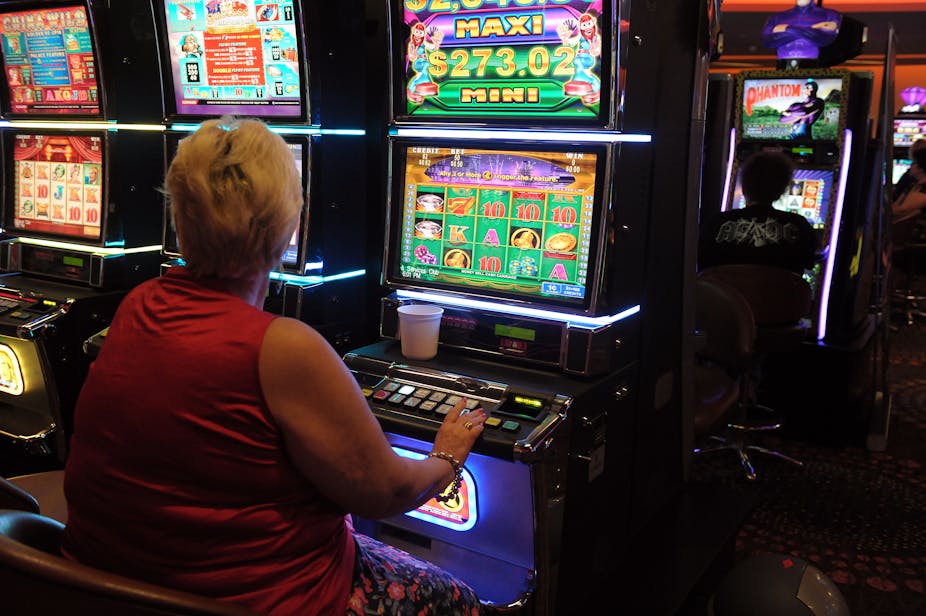Joan Kirner, who died this week aged 76, deserves to be remembered for her many achievements and unquestioned devotion to the progress of Victoria.
Kirner, Victoria’s first – and so far only – female premier, also introduced poker machine gambling to the state. Her government passed legislation in 1991 to enable a duopoly to establish poker machine venues in local hotels and clubs.
The political and economic circumstances
John Cain, who led a mostly successful Victorian Labor government, was ousted in 1990. He was seen by some as a “wowser” because of his alcohol-free habits and opposition to poker machines. That said, he led a government that had kept unemployment lower than other states for seven years, legalised sex work and reformed liquor licensing laws to provide the basis for Melbourne’s now emblematic laneway bar and dining culture.
Nonetheless, Cain resisted the clamour of the gambling industry and its friends in his cabinet to emulate New South Wales and allow poker machines to proliferate across Victoria. Former Labor MP Carolyn Hirsh, who herself fell victim to a poker machine addiction, believes that Cain’s opposition to the gambling industry was a factor in his demise. She may well be correct.
Gambling liberalisation was rapidly implemented after Cain’s ouster. As economist Julie Smith has argued, state governments found themselves strapped for cash because of Australia’s vertical fiscal imbalance – the unfortunate fact that state governments have big spending programs, such as hospitals, schools and transport, and a limited tax base to pay for it.
State governments tend to seek any revenue source they can when the money from Canberra dries up. The gambling industry happily argued that it could top up the state coffers and redirect the funds flowing across the border to NSW into the Victorian Treasury. Yet there was never any associated reduction in NSW’s poker machine revenue after they were legalised in Victoria.
As Paul Keating famously remarked:
Never get between a premier and a bucket of money.
The A$1 billion a year that club and pub poker machines now contribute to Victoria’s revenue – along with the $500 million from other gambling forms – is a decent bucket, it might be argued, at a time when even more strain is being placed on state finances.
The Cain and Kirner governments were faced with a hostile media – particularly the Murdoch tabloid press – and two major financial collapses in 1990. These collapses had difficult consequences for Victoria. The Pyramid Building society’s collapse led to the introduction of a 3c per litre fuel excise levy.
Cabinet ministers, including David White – who subsequently became gaming minister and, after he left parliament, a lobbyist for duopoly poker machine operator Tattersall’s – were influential in persuading Kirner to legalise the poker machine industry and legislate for a casino to operate in Victoria.
Kirner seems to have been persuaded by an eager pro-gambling lobby that the financial benefits would save the state – and her government. They certainly didn’t save her government.
As it transpired, poker machine legalisation led to massive transfers of revenue from some of the most disadvantaged people in Victoria to very wealthy corporations, including Woolworths and its business partners the Mathieson group, and to already large and well-heeled football clubs.
The struggle to rein in pokies
Victorian governments of both Liberal and Labor persuasion have implemented reforms that have helped to reduce real poker machine expenditure. This started with a 1999 bipartisan pre-election commitment to limit poker machine numbers to 30,000.
Since then, reductions in the maximum bet, removal of ATMs from gambling venues, smoking and trading-hour restrictions and other measures have kept poker machine expenditure flatter than it might otherwise have been.
Nonetheless, there are at least 30,000 people in Victoria with a serious gambling problem – about 80% of whom suffer difficulties because of poker machines. They affect between 150,000 and 300,000 others, such as family, friends, neighbours and employers. Another 30,000 have a lesser problem, but are still experiencing major difficulties because of gambling. Each of them affects between five and ten others as well.
Victorians lose more than $2.5 billion every year at poker machines in suburban clubs and pubs. Poker machines, and the expenditure they generate, are still concentrated in disadvantaged areas. Their effects are therefore felt most strongly by those who can least afford it.
The problematic use of poker machines is also strongly associated with financial difficulties including bankruptcy, relationship difficulties including separation and divorce, crime (both violent and financial), the neglect and abuse of children, mental and physical ill-health and, in extreme cases, suicide.
Poker machines are not benign taxing machines. They are active contributors to continued economic, social and health inequality and for the intergenerational transmission of disadvantage.
This is not a legacy of which a reforming and progressive Labor premier would be proud. It is little wonder, then, that along with former Liberal premier Jeff Kennett – who succeeded Kirner as premier and energetically oversaw the expansion of the gambling business – she regretted the expansion of poker machines into pubs and clubs. They both believed that poker machines should be limited to the casino, as occurs in Western Australia.
It is easy in hindsight to see where policy decisions went awry. Gambling is a major social problem. Perhaps the biggest addiction is that of state governments, which simply can’t give up all that money.
Kirner was a great leader and a tireless political campaigner. It is interesting that she found herself premier at a moment in Victorian political history when she was convinced by the gambling industry and its political mates that gambling revenue was the answer to a fiscal prayer.
Such is the lure of gambling – for modest punters and premiers alike.

